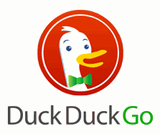Scroogle’s Gone? Here’s Who Still Offers Private Searching
You’ve probably read the news already that Scroogle is gone forever. It launched back in 2003 and was popular among searchers who wanted to get Google search results in a private setting. Now that it’s gone, where can searchers go for a more private search experience than Google and Bing offer by default? Here’s a […]
 You’ve probably read the news already that Scroogle is gone forever. It launched back in 2003 and was popular among searchers who wanted to get Google search results in a private setting.
You’ve probably read the news already that Scroogle is gone forever. It launched back in 2003 and was popular among searchers who wanted to get Google search results in a private setting.
Now that it’s gone, where can searchers go for a more private search experience than Google and Bing offer by default? Here’s a list of a few alternatives. Note that different search engines below make different privacy-related claims; I haven’t investigated them in detail — i.e., by examining cookies, etc. — so anyone looking for a private search experience should do his/her own research.
Private Search Engine Options
 DuckDuckGo
DuckDuckGo
Probably no altrernative search engine has hung its hat more solidly on the privacy issue than DuckDuckGo. In early 2011, it made a splash with the launch of DontTrack.us, a website that illustrates how Google tracks searchers (and how DuckDuckGo doesn’t).
DuckDuckGo’s privacy page is very clear: DuckDuckGo does not collect or share personal information.
People are noticing, too. Last year, DuckDuckGo was included on TIME magazine’s list of the best websites of 2011. Earlier this month, DDG set a new record with its first million-search day.

Ixquick has long advertised itself as “the world’s most private search engine.” Its privacy policy says that user IP addresses are not recorded and only sends one cookie to users’ computers — a preferences cookie that expires after 90 days. It does, however, collect and store “limited” user information — the date and time of a search, as well as the browser and platform used for the search.
Last October, Ixquick announced that it was making SSL encryption the default on all searches.
The same company also operates Startpage, which looks like the closest mirror of what Scroogle previously offered. Startpage takes a search query, removes all identifiable information about the searcher, and submits the search to Google anonymously. “Your IP address is never recorded, your visit is not logged, and no tracking cookies are placed on your browser,” Startpage’s home page explains.

Yippy is a “family friendly” portal site with a search engine that came from its 2010 purchase of Clusty.
On its About page, Yippy says “We won’t track your activity on our platform, store your history in our browser, monitor or record your searches, store copies of your email, or collect any more personal information than you volunteer. We also won’t sell your personal information to advertisers for profit.”
Yippy’s Privacy page adds that international users (i.e., outside the U.S.) “are subject to forms of minimal tracking depending as required on the country from which they originate.”

Although it’s shifting away from pure search to its Q&A roots, Ask.com continues to offer its Ask Eraser tool to searchers on www.ask.com and uk.ask.com.
Ask Eraser can be turned in Ask.com’s settings, which explains the tool this way:
When AskEraser is enabled your search activity will be deleted from Ask.com (not third-party) servers, except in rare circumstances described in the AskEraser FAQ. You can learn about the third-party partners who receive your search activity here.
Those “rare circumstances” include when Ask is asked to retain search activity data by law or government officials, or if the data is needed to “solve a critical technical issue.”

Ironically, one of the post-Scroogle options is Google itself, via Google Encrypted Search. While searches here are secure, it doesn’t actually solve the issue that Scroogle (and some of the sites mentioned above) addressed: Even when you’re using Google’s encrypted search, Google will know who you are (if you’re logged in to a Google account) and will still save your search activity if you’ve enabled the search history feature.
So, while it is a secure search option, it’s not private in the sense that the sites above claim to be private.
I should add, too, that you don’t have to visit the link above for Google’s encrypted search; in October, Google began encrypting all searches when users are logged in to a Google account.
If you think we missed any private search options, let us know in the comments!
Contributing authors are invited to create content for Search Engine Land and are chosen for their expertise and contribution to the search community. Our contributors work under the oversight of the editorial staff and contributions are checked for quality and relevance to our readers. The opinions they express are their own.
Related stories
New on Search Engine Land